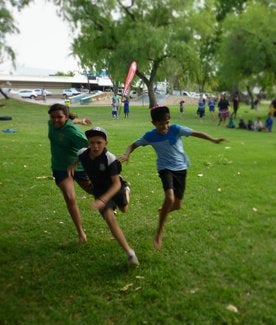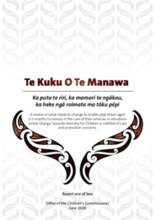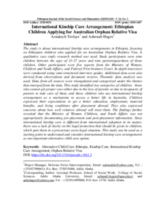

Displaying 161 - 170 of 653
The Children’s Commissioner of New Zealand undertook a thematic review of the policies, processes and practices of Oranga Tamariki Ministry for Children relating to care and protection issues for pēpi Māori (Māori infants) aged 0-3 months. This first report presents the insights gained from interviews with mums and whānau (family) who had experience with pēpi (aged 0-3 months) who had either been removed, or were at risk of being removed, from their whānau by Oranga Tamariki or its predecessor Child, Youth and Family.
This study is about international kinship care arrangements in Ethiopia, focusing on Ethiopian children who applied for an Australian Orphan Relative Visa.
This study explores how sub-Saharan African migrant parents and caregivers navigate parenting between the cultures that have shaped their lives and parenting expectations within the new environment.
Professor Megan Davis, author of the recent Family is Culture review, has criticized the government of the Australian state of New South Wales (NSW) for its decision to "reduce funding to the peak body for Aboriginal children in out-of-home care," says this article from the Sydney Morning Herald.
A new report from Change the Record "highlights numerous ways Aboriginal and Torres Strait Islander peoples have been disproportionately affected by the more punitive and restrictive policy responses to the pandemic [in Australia]," including Indigenous children in out-of-home care, according to this article from the Conversation.
"Aboriginal people [in Australia] in prisons are going without soap, and children in out-of-home care are being refused contact with their families under “punitive” restrictions enforced due to Covid-19," says this article from the Guardian.
In this study, a transdisciplinary group of key stakeholders in Australia jointly constructed a causal loop diagram to bring forth the systemic structure underlying the issue of repeat child removals (where parents lose successive infants and children to out-of-home care) and identify system conditions that need to be altered.
This article presents a multi-site evaluation of a group delivery of the eight-week Circle of Security-Parent DVD program (COS-P) program to foster carers of 6-12 year-old children in an urban community as facilitated by community-based providers from a specialist child and youth mental health services.
In this post from UNICEF Australia's blog, UNICEF Australia Program Manager for Early Childhood Development, Alice Hall describes some of the impacts of the COVID-19 pandemic on children, including the child protection implications.
"A new study predicts that demand for foster care is likely to rise during the coronavirus pandemic, as households struggle with the economic impacts of bans and restrictions," says this article from SBS News.


